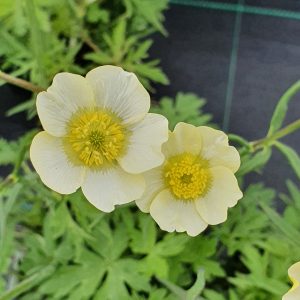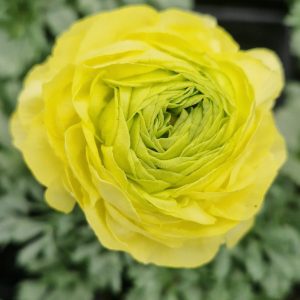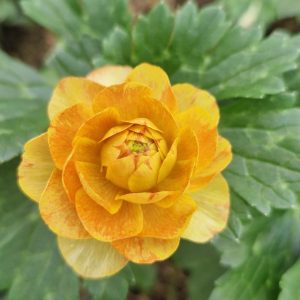Ranunculus, often known for its vibrant and densely packed blooms, is a delightful addition to gardens. To ensure optimal growth and flowering, follow this comprehensive planting guide:
Choosing the Right Location
Sunlight: Plant Ranunculus in a location that receives full to partial sunlight. They thrive in well-lit areas but appreciate some afternoon shade in warmer climates.
Soil: Use well-draining, loamy soil with a slightly acidic to neutral pH. If your soil is heavy, consider amending it with organic matter to improve drainage.
Planting Time
Autumn Planting: In most regions, plant Ranunculus bulbs in the autumn, at least 6-8 weeks before the first expected frost. This allows them to establish roots before winter.
Planting Depth and Spacing
Depth: Plant the Ranunculus tubers 2 inches deep with the claw-like side facing down. If you’re unsure about the orientation, place them horizontally.
Spacing: Space the tubers 4-6 inches apart to allow for proper air circulation and prevent overcrowding.
Watering
Initial Watering: After planting, provide a thorough watering to settle the soil around the tubers.
Subsequent Watering: Keep the soil consistently moist but not waterlogged during the growing season. Ranunculus appreciates regular watering, especially during dry periods.
Mulching
Mulch Application: Apply a layer of mulch around the plants to conserve moisture, suppress weeds, and regulate soil temperature. Keep the mulch away from the crowns to prevent rot.
Fertilisation
Pre-Planting: Incorporate a balanced, slow-release fertiliser into the soil before planting. Avoid using high-nitrogen fertilisers, as they can encourage foliage growth at the expense of blooms.
Midseason Feeding: Apply a phosphorus-rich fertiliser when the plants are actively growing to support flower development.
Staking
Staking Needs: Ranunculus plants may benefit from staking, especially if they are tall or if your area experiences strong winds. Use stakes to provide support without damaging the tubers.
Deadheading
Regular Removal: Remove spent blooms regularly to encourage continuous flowering. Deadheading also directs energy towards new bud development.
Overwintering
Mulch for Winter: In colder climates, apply a layer of mulch over the planting area after the first frost to protect the tubers from winter temperatures.
Pests and Diseases
Vigilance: Keep an eye out for pests such as aphids or snails. Treat promptly with organic or chemical solutions if needed. Ranunculus is generally resistant to diseases but may suffer from rot in waterlogged conditions.
Enjoying Blooms
Cut Flowers: Ranunculus blooms make excellent cut flowers. Harvest them when the buds are just starting to open for longer vase life.
By following these guidelines, you’ll help your Ranunculus plants thrive and reward you with a stunning display of colourful blooms.













